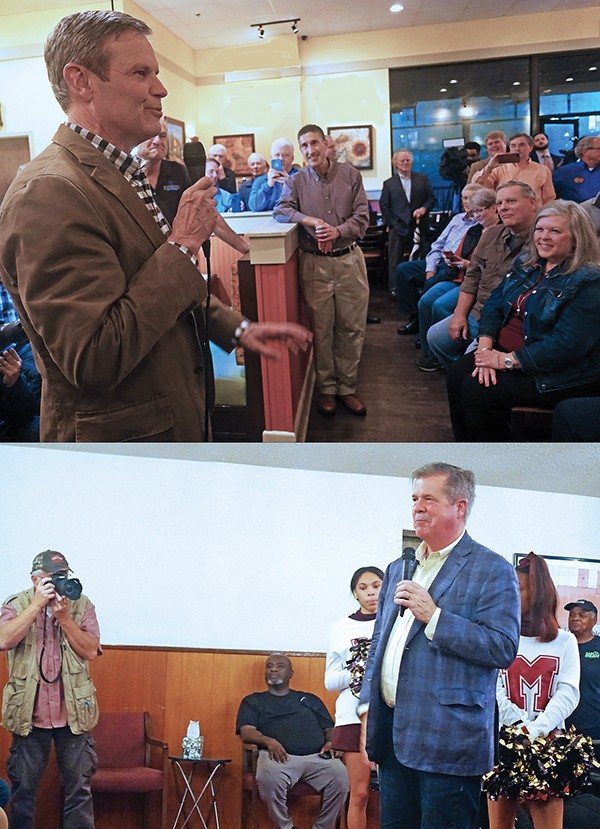To say it plainly, Monday night of this week was a challenge — for candidates who wanted one last opportunity to see and be seen; for party operatives determined, by hook or by crook, to expand the next day’s turnout for their charges; for those undecided voters who realized that their one last fleeting chance to experience specific candidates directly was at hand; for reporters whose wish was to cover the last moves of major candidates before Judgment Day on Tuesday, November 6th, and at the same time, as circumstances allowed, to check out the much-ballyhooed “Transition Report” of County Mayor Lee Harris at the FedEx Event Center (one had to wonder about the Election Eve scheduling for the event, given the competition for attention).
And complicating it all was the monsoon, a huge series of rain showers that lasted through the evening, creating flash floods and traffic jams and direly complicating all those imperative hopes and ambitions mentioned above.
 Jackson Baker
Jackson Baker
Bill Lee (top) and Karl Dean with Memphis supporters on Election Eve
Still and all, it was a major night for Shelby County. It had to mean something that former Governor Phil Bredesen sandwiched in a last visit to Shelby County, at Jim Neely’s Interstate BBQ on South Third, between events in Jackson and his home town of Nashville, site of his onetime mayoralty and his two terms as Tennessee governor.
Unfortunately for those Democrats who wanted to embrace all their heroes at once, their gubernatorial nominee, Karl Dean, who succeeded Bredesen as Nashville mayor, was holding forth under the roof of Hoskins Road Spiritual Kingdom Church, many miles away, accompanied by 9th District Congressman Steve Cohen. An advance ad for the event had indicated that Bredesen would be there, too — a physical impossibility and not just because of the torrential downpour.
Not only was Memphis the last stop on Dean’s long and winding trail, he was scheduled also to do a poll visit or two here on Tuesday morning. Clearly, he was a believer in the enduring nature of the Democratic blue wave, which crested here unmistakably in the runup to August 2nd, when Democratic candidates performed a clean sweep in the county general election.
And the deluge of new voter applications since, right up to the registration deadline of October 9th, had given Shelby County Election Commission officials all they could process, and then some. Moreover, even though the great Kavanaugh/Supreme Court flap had allegedly been a spur to Republican enthusiasm as well, there was no doubt that most of the new-voter gain was going to the Democrats’ side of the voter rolls.
Consequently, Dean, abetted by the ever-intensive Cohen and other attendant party stars, managed a plausible optimism in his remarks to the well-wishers who had braved the storm.
Even as Dean intended to spend the night in Memphis, his opponent, Republican nominee Bill Lee, was finishing up a last statewide dash with an address to supporters at Another Broken Egg Cafe at Park Place in East Memphis. Looking around the interior of the place, Lee described it as “packed,” and he wasn’t wrong. He proceeded to deliver a valedictory on his surprisingly successful outlier campaign that sounded simultaneously like a proclamation of victory.
And, given the apparent message of such polls and other samplings that have been taken in the general election campaign, the Franklin businessman may well have been entitled to look and sound as confident about the outcome as he did, and he elaborated once more on his running theme that redoubled efforts to expand the economy and infrastructure of Shelby County would be high on his intended agenda in office and necessary ones for the state itself to prosper.
In any case, there was no doubt that, with both Dean and Lee choosing to end their gubernatorial campaigns here, Memphis bore a prominence in this election and an influence on its results that seemed almost to hearken back to an earlier time, the Crump era, when the city was the undisputed pivot of the state’s political direction.
And, no doubt about it, the next governor of Tennessee was here on Election Eve.
It remained to be seen whether such a statement could be made about the U.S. Senate race. Bredesen certainly made an effort to show his flag, appearing here with some frequency, even before his braving of the deluge Monday night. For whatever reason, Republican nominee Marsha Blackburn, the Congresswoman whose 7th District at one point, before the last redistricting, took in a sizeable hunk of eastern Shelby County, was not so much in evidence locally.
But, during the course of things, she had had two marquee appearances with her party leader, President Donald Trump. One was at a Trump rally in Southaven last month; another was in Chattanooga, in east Tennessee, this past weekend.
• For all the bad weather and the other claims on people’s attention, a generous crowd turned out at the FedEx Event Center at Shelby Farms Monday night for a formal presentation of a report from the transition team of Shelby County Mayor Lee Harris.
The team, which numbered some 40 people, was chaired by former Grizzlies coach Lionel Hollins and Paul Morris, president of Jack Morris Auto Glass. Danielle Inez was its executive director.
The transition report covered such areas as education, transportation and community development, criminal justice, health care, economic development, and government structure and metrics.
Coincident with the transition report, Harris and Shelby County Commission Chairman Van Turner recently announced the resolution of a matter that had bitterly divided the previous commission and former Mayor Mark Luttrell. That was the commission’s desire for its own staff attorney to represent its interests vis-à-vis the administration. Harris and Turner agreed on a resolution allowing Turner, as commission chair, to select an assistant county to serve the commission in that regard. That attorney will be Marcy Ingram, a longtime favorite of commission members.
